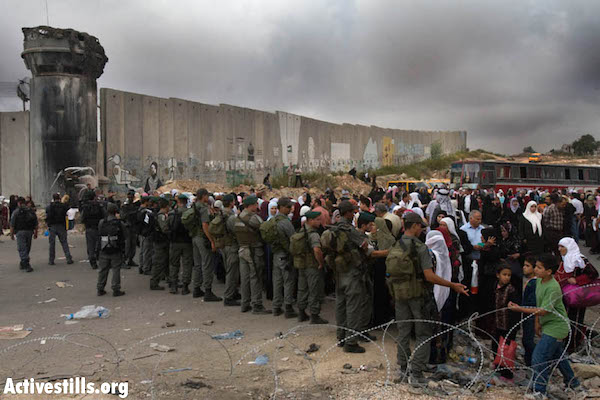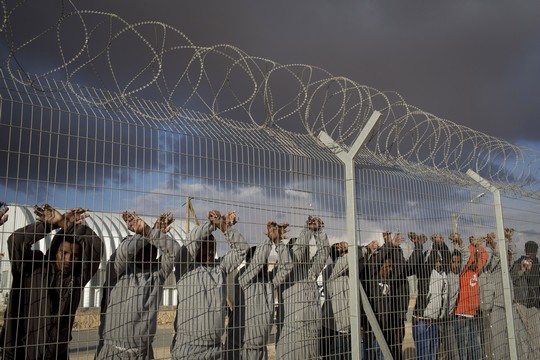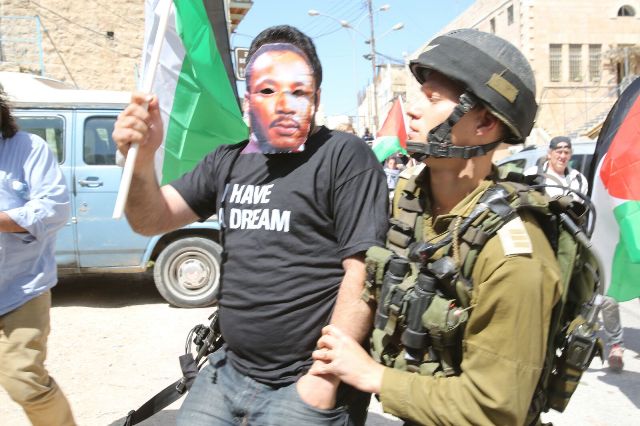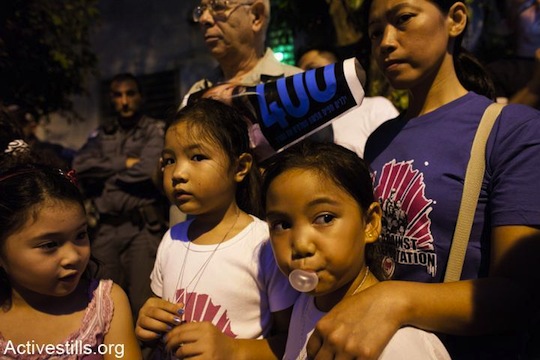Over 200,000 people with no legal status live in Israel today. There are another 4 million in the West Bank and Gaza Strip. All of these people are directly affected by Israeli elections but they have not right to vote. This is what they have to say — about the Right and the Left, the ‘demographic threat,’ peace, war, democracy and dictatorship.
‘Occupied people cannot vote for their occupier’
By Bassam Almohor

The argument heats up at one of the tables in this men-only café in a Palestinian city.
Israeli elections are a hot topic of discussion for the Palestinians here. At this table, a man with a suit and tie argues that if Herzog/Livni win we will secure a peace agreement in our favor, and recall the historic White House handshake between Arafat and Rabin 22 years ago. He regrets that there has been no courageous Israeli politician with the guts to sign a historic deal with the Palestinians like the late Prime Minister Rabin.
A man with a dark, thick mustache takes the other side, and say that the Left is dead, for 25 years since the collapse of the Soviet Union. Only the Right, the Likud, he says, can sign a deal and agree to withdraw from occupied lands, like late Sharon who withdrew from Gaza 10 years ago.
A loud shaved-headed man argues that we need the Right — or even the far-right — to win. They are extreme, and with their measures against the Palestinians, their indifference to international resolutions and their violations of human rights and war crimes against the occupied people — they will lose in the international arena. The Palestinians would gain more support in international institutions, which in turn would create major pressure on Israel to give up. The BDS movement is spreading wide and gaining momentum in Western Europe and the U.S., thus cornering Israel and forcing it to accept a just and lasting peace.
There is another short man with round eyeglasses who says, no, it doesn’t matter to us who wins: the Israeli Left and Right are two sides of the same coin. The coin has many sides with lost of political names, yet for us, it is the same: Israel, our occupier for the past 48 years, or 67 years. These elections do not concern us; it’s a political struggle between political giants who fight over internal issues that do not concern us. Israeli policy towards the Palestinian does not change whether the winner is the Likud, Labor, the Center, the religious, the settlers, the Russians, or whoever.
A Palestinian contrarian, with the face of a philosopher, sits in the front corner listening to the argument but does not participate. He tells me, “It feels awful, absurd, and stupid to see this occupier vote, practicing so-called democracy. My occupier practices democracy on my land, my occupier is not only an oppressor; my occupier is a wicked hypocrite. This ‘democracy’ thing makes me sick. Every time they practice democracy in Israel I feel more wars coming, more misery, more destruction, more images of shattered bodies and torn buildings, more blackness looming in the sky. I feel bad. I feel the worst yet to come.”
I, too, listen and think of these elections: These are not our elections; occupied people cannot vote for their occupier; Israel is not “a state of its citizens”; “I am not a firm believer in democracy.”
I remain silent.
Bassam Almohor is a photographer and tour guide from Ramallah. He blogs for +972’s Hebrew language sister site, Local Call.
‘I support anyone who won’t deport me’
By Mutasim Ali

The truth is I really don’t want to get involved in Israeli politics because I’m a resident and I have absolutely no intentions of staying in Israel. In addition, I don’t want to add fuel to the claims of right-wing Israeli politicians who say we are a demographic threat.
That said, nobody can deny the fact that we asylum seekers are a community of 47,137 people, which is not a small number.
Regardless of how politics work in Israel, we in the asylum seeker community have organized ourselves quite impressively. And politics is how different people get to live together. Period.
There is no doubt that we’re greatly affected by Israeli politics and politicians. As of right now, less than a month and a half before the elections, would you be surprised if I told you every one of us is wondering and asking what the next government will look like? Who will next prime minister be?
Some people have gone so far as to ask whether Ehud Olmert might be back again. He is the one who gave status to hundreds of Darfuris, which is diametrically different to the way all other African asylum seekers are treated in Israel.
I don’t care who wins but I stand with anybody who supports me in my plight and who says no to retroactively punishing me for the way I entered Israel. I’m with anyone who will not deport me to a place where I have a well-founded fear for my life and liberty.
Once I and others gain legal status, I believe we will begin to see an end to the problems in many Israeli neighborhoods and cities — not just south Tel Aviv but other areas as well. As a matter of fact I helped run a campaign for city without borders in 2012, not because I want to be a part the complex conflict between Left and Right, but because I’m done with the lack of policies and the political deception. I felt I had to start the campaign because of the way the asylum seeker issue was being used for political gain.
I believe that to be a good politician you need to be honest and believe in what you’re fighting for. For example, see the contradiction in some of those parties that voted for the anti-Infiltration Law last December but also believe deep down in their bones that it is not at all fair, and that it is also not for the good of Israeli residents of south Tel Aviv and other areas.
If I’m asked who I would vote for, if I could, I would gravitate toward the Left. That is because I was born liberal; I was educated by liberal parents to never think only inside the box and to believe strongly that different races and colors can live together. That would be true in any country, regardless of my legal status.
To Israelis, of course you know better than I whom to vote for. But if you ask me, I would say go with those candidates who will improve your daily lives and tackle the real issues.
Don’t support those spreading hatred, animosity, fear, racism, and of course not those taking for themselves recycling redemptions on the public’s bottles. By the way, I have a ton of empty bottles of water and some soft drinks in my room but because in Holot there is no place to recycle them, I should probably bring them to Jerusalem. I heard they know what to do with them there.
Finally, I wish the best of luck to your candidates and hope that this time is different. I really, really want what is best for Israeli society. We strangers come after.
Mutasim Ali, 28, originally from Darfur, has been in Israel since 2009. He has been imprisoned in the Holot detention facility for African asylum seekers for eight months.
The inevitability of civil rights for all
By Sam Bahour

There is a single supreme governing body between the Mediterranean Sea and the Jordan River; it is the Israeli parliament, called the Knesset. This has been the case from June 1967 until today, without interruption.
Approximately half the people governed are denied any representation within that parliament. What does this mean in reality? It means that a set of Israeli legislators make the decisions that shape every aspect of the lives of approximately 4.5 million Palestinians living in the West Bank and Gaza Strip.
Except as soldiers in Israel’s military or as illegal settlers, most of these legislators have never set foot in the West Bank (very few could even navigate their way around East Jerusalem) or in the Gaza Strip.
We do not have 3G on our mobile phones because Israeli decision makers prohibit it. Students from Gaza and the West Bank are unable to attend each other’s universities, because Israeli decision makers, who could not find these Palestinian universities on a map, prohibit the two parts of the occupied territory from freely interacting. This draconian list is long and its ramifications are harsh.
The bottom-line for us Palestinians ‘living’ under Israel’s boot of occupation: Historically, in the U.S. and many other places, when a population is long disenfranchised, unrest ensues, forcing greater equality. Jewish Israelis living in perpetual denial should take note when they head to their polling booths this March, for their sake if not for ours. The looming fork in the road for us is signposted “Palestinian Statehood” or “Civil Rights for All.” While the idea of the former is dispensable, the coming of the latter is inevitable.
Israel pretends its society is a normal, American-style melting pot, but there are only two problems: there is nothing remotely “normal” about Israeli’s societal composition and, furthermore, the pot’s ingredients, by policy design, have yet to melt.
The destructive societal divisions among Israel’s population shine through in every election; this time around is no different. While Israel’s nearly five-decade military occupation of Palestinians is slowly, but surely, ripping Israel out of its global comfort zone, not one electoral contender has peeped a word about how the occupation will come to an end.
Likewise, while racism inside Israel against Christian and Muslim Palestinians — full Israeli citizens — has reached levels provoking even some Jewish Israelis to call it fascism, Israel’s political parties are acting as if it’s business-as-usual. The only bold and somewhat refreshing electoral move, thus far, is Avraham Burg’s joining of the Hadash Party, and even there the debate immediately focused around Palestinian political parties running in a single slate, or not, instead of the seismic shift that Burg’s move represents amongst Israel’s Zionist personalities.
Sam Bahour is a Palestinian-American business consultant in Ramallah and serves as a policy adviser to Al-Shabaka, the Palestinian Policy Network. He blogs atePalestine.com.
‘I hope Israelis vote for someone who doesn’t think only of himself’
By Marife Adriano

It’s very strange to have been in Israel so many years and to not have a right to express my opinion about the government.
Governments make decisions that affect us, foreigners. I have been living here 19 years, I love this country. But people like me, and others who have been here even longer, are still classified as “foreigners” and are regularly deported. Others die because their legal status changes and suddenly they don’t have access to medical care.
People work for this country for years, but they aren’t given an opportunity to become a part of it. If I hadn’t given birth to my son I would be one of those in danger of deportation. I lived here without any legal status for 13 years before getting status as a resident in 2008. But what about all the others in my situation who don’t have children?
If I could vote I would support anyone who advances the peace process, and any politician who proposes a new path for tackling the country’s problems. I hope that Israelis vote for somebody who doesn’t think only of themself but rather of all the people who live here, and who will bring peace for everyone.
Marife Adriano is a migrant worker from the Philippines who has been in Israel since 1995. She is a mother of one son who was born in Israel, and who holds permanent residency but is not a citizen.
A version of this article was first published on +972’s Hebrew-language sister site, Local Call. Read it in Hebrew here.

